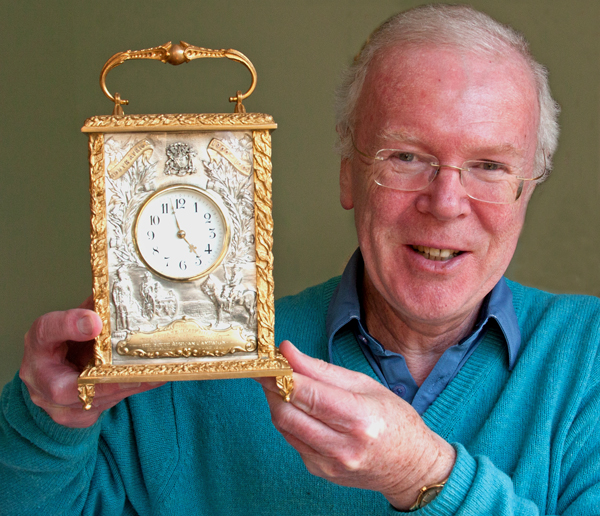AN HISTORIC carriage clock presented to a Boer War soldier from Helensburgh in 1901 has returned to the town for the first time in many years.
The clock, made to a special design by Messrs Elkington & Co. of London of oxidised silver and brass, was presented to Private William McKinlay of the Argyll and Sutherland Highlanders.
Now it has been bought by Helensburgh Heritage Trust for £5,000, with the help of an anonymous benefactor, and it will soon be on display in the Heritage Centre in Helensburgh Library in West King Street.
Heritage Trust chairman Stewart Noble (pictured) said: “I am absolutely delighted for a number of reasons that the Trust has been able to purchase this Boer War clock.
“Firstly, it could not have a stronger link to Helensburgh — after all, the Burgh coat of arms on it.
“Secondly, the clock has come back home to Helensburgh. This fact made Derek Roberts of Derval Antiques at Edenbridge in Kent very pleased as well when he sold the clock to the Trust.
“Thirdly, it is a most beautiful object, in excellent condition, and working perfectly.”
The Trust first heard of the clock in the summer of 2012, when Richard Johnson from Edenbridge got in touch to say that he was researching the history of the clock.
“I volunteered to help with research into this fine antique clock, which turned up at our local antique shop,” he said at the time. “It was a chance encounter in the shop with the Derek Roberts.
“I dabble, no more, in some military research and, because I find it interesting, I agreed to help if I could. I think the main area of interest revolves around the fact that such a fine clock was presented to a Private. He must have been very highly regarded locally.”
The files of the Helensburgh and Gareloch Times revealed a fascinating story, and in all 22 burgh soldiers who served in the Boer War between 1899 and 1901 received these clocks.
Poor logistics, disease and clever Boer fighters made the South African campaign a tough one for the British soldier. This was recognised at home, so when the Volunteers, Yeomanry and sharpshooters came back from the war they were given a reception in the Victoria Hall in June 1901 by the Provost, Colonel William Anderson, and the Magistrates.
The Provost said that a carriage clock, a sample of which was on the platform, would be sent to each of them. In fact they were presented personally at a ceremony in the Municipal Buildings in November of that year.
The clocks cost ten guineas each, and the total cost to Helensburgh Town Council was £261, including a plaque which was erected in the Municipal Buildings and is still there.
This contains 44 names, and it is likely that the second 22 served there in 1902 when the Boer were still conducting an effective guerilla campaign, but did not receive clocks when they returned.
“We have to acknowledge the tremendous generosity of an anonymous donor,” Stewart said. “Without his gift we would not have been able to buy the clock."
- See also Boer War Soldiers given clocks.





